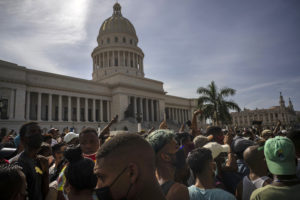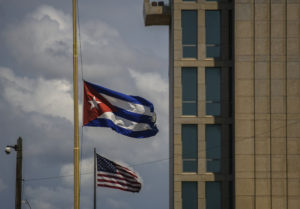By Geoff Thale
Yesterday’s foreign policy debate between President Barack Obama and former Governor Mitt Romney featured some spirited debate about Libya, Syria, Iran, the size of the U.S. Navy, and teachers.
Yet the debate featured almost nothing about Cuba. Mitt Romney complained, in passing, that President Obama was willing to talk with Fidel Castro (as part of a larger complaint that the President was too accommodating to governments with whom the United States is at odds). But Obama did not respond and, beyond that, the issue did not come up. This absence is surprising, especially because the foreign policy debate took place in Florida.
It was not always this way.
In 1992 candidate Bill Clinton endorsed the Cuban Democracy Act, a measure to further tighten the embargo on Cuba, while campaigning in Florida; President George H.W. Bush announced his support for the Cuban Democracy Act shortly thereafter. In 2000 Al Gore faced considerable opposition from the Cuban-American community in the wake of the Elian Gonzalez crisis; in an effort to woo the Cuban-American vote, his vice presidential candidate, Joe Lieberman, visited the grave of Jorge Mas Canosa, the founder of what was then the leading pro-embargo Cuban American organization.
Last night, the issue barely came up. Neither candidate sought political advantage by bashing Cuba or trotting out his “anti-Castro” credentials.
What happened?
There are a few obvious answers. The candidates wanted to focus on domestic policy and the U.S. economy, and they repeatedly steered the conversation away from foreign policy. And the foreign policy discussions that the candidates did engage in were all about national headline issues such as Iran, Afghanistan, Syria, Libya, and China; Latin America did not appear on the agenda.
But the silence on Cuba also suggests some changing political dynamics.
First, President Obama’s modest easing of U.S.-Cuban tensions, and particularly his relaxation of travel restrictions for Cuban Americans, are not particularly controversial, even in South Florida. The Romney campaign does not see much to be gained by highlighting differences on this issue.
Second, the demographics of the Cuban-American community, which have been changing for years, are finally having an impact in the electoral arena (for example, the race between hardline Cuban-American Rep. David Garcia and more moderate Cuban-American challenger Joe Garcia is essentially tied). The older hardline Cuban exiles have been losing ground to younger and newer voters, who are more concerned about domestic politics and want to be able to visit relatives in Cuba. These newer voters are not necessarily friends of the Cuban regime, but Castro-bashing is not high on their agenda and does not win their vote.
The decline in Cuba’s salience as a domestic political issue is an encouraging sign. It suggests that, over time, we might be able to have a more rational discussion about U.S. interests, the changes that are occurring in Cuba itself, and how the United States might play a constructive role in improving the climate for human rights and democracy in Cuba.
Geoff Thale is WOLA’s Program Director. Mr. Thale has studied Cuba issues since the mid-1990s and traveled to Cuba more than a dozen times, including organizing delegations of academics and members of Congress.
Photo by OpenDemocracy


